 Iskra Research
Iskra Research  Iskra Research
Iskra Research 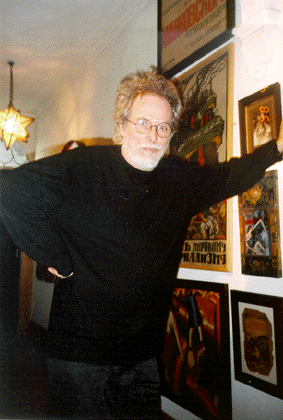
In London in the modest neighborhood of Islington, about 15 minutes walk from the Undergrond there stands, in a row of similar family homes, a small house. The small front and back gardens have overgrown with unkempt bushes. It would appear that the inhabitant is not too worried about the outward respectability of his home.
This house contains a unique museum of the Russian Revolution and the Soviet Union. Its owner David King has for over thirty years devoted himself to collecting and preserving photos, posters, artwork and other visual forms of propaganda which reflect the history of the October Revolution, of Communism and Stalinism.
I was led to this house through my search for some photographs to illustrate the future publication of an anthology of works by one of the leading Soviet politicians and diplomats of the Lenin period, Adolf Joffe. Joffe was one of the pioneers of the Russian Revolution and the Soviet state. A supporter and a close personal friend of Trotsky, during the period between 1905 and 1917 he was active in the left wing of the Menshevik party and, following the February revolution he led a determined fight for the "permanent revolution" among the Mensheviks and leftist social democrats. This led him into the Bolshevik party and, in August 1917, into its Central Committee. Within the CC Joffe occupied an extreme leftist position within the party's leadership, for the armed uprising in October, for a solid Bolshevik government as against any compromise with the Mensheviks and SRs. Joffe was the initial chairman of the Russian delegation to the peace talks with Germany at Brest-Litovsk. After the peace treaty was concluded he was the Soviet envoy to Germany. During the next few years Joffe served the Soviet Republic in the most responsible posts: during the Civil War he worked as the responsible Commissar in the Ukraine, in the Lithuanian-Belorussian republic, in Turkestan; then he was sent abroad as the plenipotentiary in Germany, Austria, Italy, Britain, China and Japan. Yet, when the Stalin faction began to take control over the young state Joffe was recalled from these responsible posts, and in 1927 he committed suicide, partly because of his debilitating illness, and partly as a sign of protest against the expulsion of Trotsky and Zinoviev from the Party. During the succeeding years his very name was written out of the history textbooks and burnt out of public memory. The soon to be published book will help in restoring the historical memory of the Russian and other peoples.
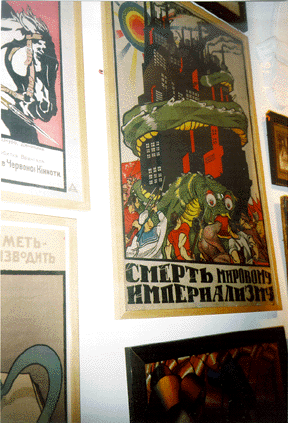
David King had in his youth become interested in the history of the October Revolution and the Soviet Union. A photographer, art editor and designer, he worked for a time as an editor of the London Sunday Times color magazine. In the late 1960's and early 1970's he was active in the Trotskyist movement and helped the Socialist Labour League (this was the current name of the British section of the International Committee of the Fourth International) to publish a number of books and photo albums. Then he published two widely known albums about Trotsky, and last year he published another photo album called "The Commissar Vanishes", which tracks the history of photographic falsifications committed by the Stalinist regime.
At present comrade King stands apart from any political party, but continues to be a socialist, criticizing the Labour government for its bourgeois policies and remains supportive of the struggle of the Marxists-Trotskyists for the restoration of historical truth. He told me that he is pleased to have produced the book covers and photo albums which had attracted to Trotsky's ideas more buyers and readers than could have been enticed by dry volumes of textual documents.
David's collection includes over two hundred thousand photographs, posters and paintings depicting the dramatic story of the first workers' state. This collection is well known among historians, publicists and journalists around the world; many editors of works about Russia use the services of David King to illustrate their books and documentary films.
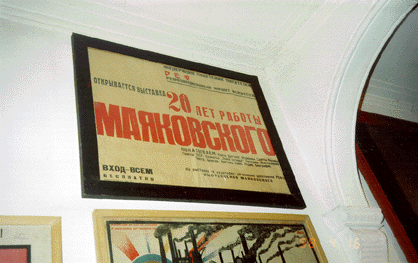
The walls inside the house-museum are covered with various posters and paintings dating from the early years of Soviet power. The collection of photographs is strictly classified and is kept in special cases of drawers. But it's the walls of all the corridors, rooms and staircases that strike a visitor with their rich display of rare exhibits of Soviet culture and history. In one place there is a poster announcing a famous exhibit, that took place in early 1920's, devoted to Vladimir Mayakovsky's twenty years of creative work. By its side are displayed some agitation posters from the Civil War.
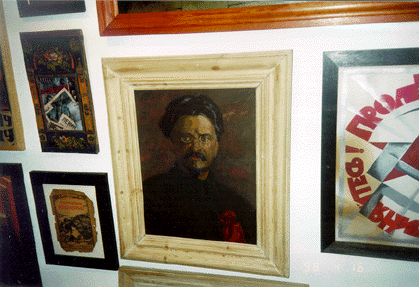 Further on is a beautiful oil portrait of Leon Trotsky, then some Futurist posters of the reconstruction period which followed the conclusion of the Civil War.
Further on is a beautiful oil portrait of Leon Trotsky, then some Futurist posters of the reconstruction period which followed the conclusion of the Civil War.
David King's library contains rare illustrated books and photo albums from the first years of Soviet power, displaying photos of Trotsky, Joffe, Rakovsky, Piatakov, Zinoviev, and other leaders of the Revolution. All of these volumes were later destroyed by Stalin's gendarmes, their heroes shot in the cellars of the Lubianka. King collects rare issues of Soviet and Comintern journals of the 1920's, postcards of those years depicting the "enemies of the people", etchings, paintings and other unique and educational exhibits.
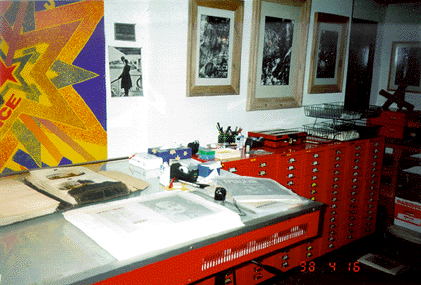
The bourgeois West possesses many wonderful libraries and book collections. The larger ones contain millions of books, whole floors shelving microfilmed Soviet newspapers and journals, collections of photographs, numerous stacks of works about the history of Russia and the USSR. Sovietology was for many decades a popular and well-subsidized industry. Tens of thousands of scientists, specialists of various professions — engineers, physicists, chemists and mathematicians, economists, ethnologists and sociologists, military analysts, geologists, literary and art critics, writers and poets — devoted their careers to studying all the aspects of Soviet history and society. This branch of western science pursued two goals: first of all, to investigate the strong and weak spots of the Soviet enemy in order to fight him all the better; secondly, to develop the basis for a sustained public relations campaign in the West so as to undermine the idea of socialism. The second goal was carried out successfully, but at the cost of an unscientific identification of socialism with Stalinism, and, in the final analysis, at the cost of undermining the first goal of analysis and forecast of Soviet developments. The well developed and well funded western Sovietology generally speaking failed miserably in foreseeing or explaining the collapse of the Soviet Union and the other Stalinist states when their ruling bureaucratic elites switched sides and installed capitalism. 99% of the contents in the huge and wonderfully equipped libraries of Sovietology are nothing but illustrations of vacuity and sterility of bourgeois social thought of the 20th century.
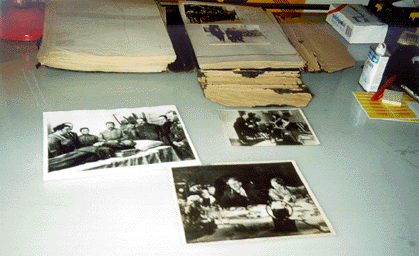
Unlike those large bourgeois libraries, King’s modest personal collection was based on the correct and fruitful idea that Stalinism was the enemy and antithesis of socialism. The photographic documents carefully collected by David King clearly prove that the first and main enemies of the bureaucratic despotism in the Soviet Union were precisely the real Marxist revolutionists, the comrades of Lenin. "The commissars who vanished" — are Trotsky, Joffe and their comrades. That is why the David King Collection is today of a great scientific and cultural value and it will be a crown jewel in the storehouse of the future communist culture.
So, what about Joffe's photographs? Yes, David King had found in his collection a few rare pictures of the first Soviet diplomat. You may see then in the anthology of the works of Adolf Abramovich Joffe, that is appearing this autumn.